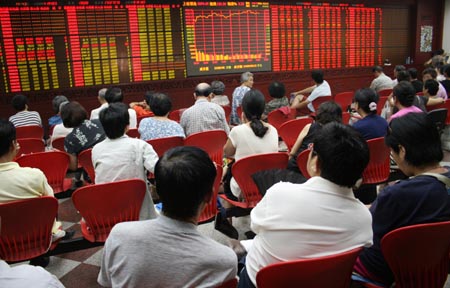Index overcomes monetary tightening; hits one-month high
Updated: 2007-07-23 16:41
 Investors flock into an exchange in Jilin City in Northeast China's Jilin Province. Monday benchmark Shanghai Composite Index closed at 4213.36, 3.81 percent higher than last Friday's close. [newsphoto] |
Contrary to most predictions, the weekend monetary tightening decisions cast little impact on the Chinese A-share market and pushed the index dramatically upward to a one-month high, symbolizing a major recovery of investor confidence after the month-long correction.
The bench mark Shanghai Composite Index continued Friday's bullish trend with a high open at 4,091.24. Led by strong performances of blue-chips like Sinopec and Baosteel, the index advanced past important markers at 4100 and 4200 points successively before closing at 4213.36, 3.81 percent higher than last Friday's close.
The Shenzhen Component Index, tracking the smaller Shenzhen Exchange, performed even better with a 5.38 percent gain and closed at 14139.27.
Transaction value expanded greatly for both markets. The bourse of Shanghai claimed 154.33 billion yuan worth of share trading, while the market of Shenzhen traded 76.46 billion yuan within the day. Both topped the month's record and sent an encouraging sign of more participation.
 |
| Shanghai Composite Index Source: www.sina.com.cn |
Performances of individual share performed even more strongly. Of all the shares listed in the two markets, more than 100 stocks sealed at their maximum rising cap. Only ten went lower in both markets. Stocks of banks and property sector continued their rally. Other sectors ranging from steel to paper-making and communication also revealed their attraction. Baosteel, China's leading steel maker, staged a maximum daily gain and closed at 12.07 yuan. Paper manufacturer Huatai, Communication giant China Unicom also performed well today.
However, shares of insurers like China Life and Ping'an Insurance made the loser list, probably due to worries that profit margins may not exceed the rising interest rates.
|
|

